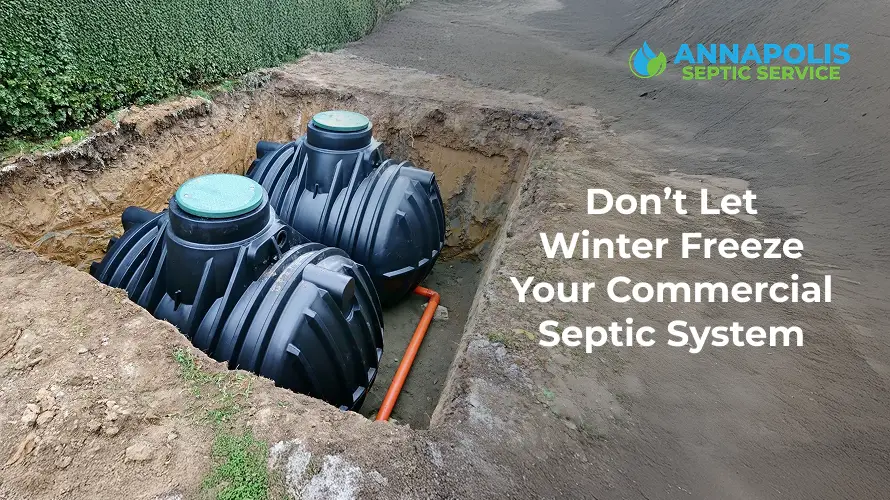As winter approaches, the challenges of managing a commercial property extend beyond snow removal and heating systems. One area that is often overlooked but can cause significant disruption is your commercial septic system. Frozen pipes, blocked drains, and overloaded tanks can quickly become emergencies, especially in colder months. Preparing your system before winter arrives isn’t just smart, it’s essential.
This blog will guide you through key steps to winter-proof your commercial septic system, outline essential maintenance, and help ensure your business operations continue smoothly throughout the colder months.
Why Winter-Proofing Commercial Septic Systems Matters
Commercial septic systems handle larger volumes of wastewater than residential setups, making them more vulnerable to winter-related issues. Cold weather can slow bacterial activity in the tank, increase the risk of freezing in pipes or drains, and exacerbate existing clogs.
Neglecting winter maintenance can result in:
- Backed-up toilets and sinks
- Overflowing tanks
- Damage to drain fields or underground piping
- Costly emergency repairs
Taking proactive steps now can save businesses significant downtime and future expenses.
Essential Winter Maintenance for Commercial Septic Systems
1. Schedule Professional Commercial Septic Tank Cleaning
Even if your system seems to be functioning normally, regular commercial septic tank cleaning is critical. Solids and sludge build up over time, reducing tank capacity and increasing the likelihood of frozen backups in winter. A professional cleaning ensures wastewater flows efficiently and prevents blockages in both the tank and the drain field.
2. Inspect Tanks and Mechanical Components
Large commercial systems often include pumps, valves, and alarms. Inspecting these components before winter ensures they are functioning correctly. Malfunctioning pumps or valves in cold weather can lead to system failure or costly repairs. Routine inspection is a cornerstone of commercial septic tank maintenance.
3. Protect Pipes and Exposed Infrastructure
Freezing temperatures can cause pipes to crack and damage mechanical equipment. Insulating exposed lines, using heating cables where appropriate, and covering vulnerable components can prevent costly winter damage. Ensure your team is aware of the location of all critical access points for quick troubleshooting.
4. Manage Water Usage Wisely
Heavy water usage during cold months increases the risk of overloading your system, especially if your system’s bacterial activity is slowed by low temperatures. Encourage staggered laundry cycles or monitor peak usage periods to avoid stressing the system.
Key Considerations for Commercial Properties
Commercial septic systems vary widely in size and complexity. Factors such as peak occupancy, restroom counts, and kitchen usage can all impact tank performance. Regular documentation of maintenance schedules, pump inspections, and cleaning history ensures your system is prepared for winter challenges.
If you manage multiple commercial properties or complex systems, it’s wise to create a maintenance checklist that includes monthly inspections, seasonal cleanings, and yearly comprehensive reviews.
Signs Your Commercial Septic System Needs Immediate Attention
Even with preventive maintenance, issues can arise. Watch for warning signs that indicate urgent service may be needed:
- Slow drains or toilets backing up
- Strong odors near tanks or drain fields
- Standing water or saturated areas around the tank
- Unusual sounds from pumps or alarms
Noticing these issues early can prevent a minor problem from escalating into a full-blown winter emergency.
DIY Checks and Routine Winter Tips
While professional maintenance is key, there are a few steps you can take in between inspections:
- Keep access lids clear of snow and debris to prevent ice buildup
- Monitor water flow and usage patterns
- Ensure drain fields remain free from heavy equipment or compacted snow
- Avoid harsh chemicals that can disrupt natural bacterial activity
For additional insights into how winter specifically affects your system, read our blog post How Winter Weather Impacts Your Septic Tank: What You Need to Know. It offers a deeper look at seasonal challenges and preparation tips.
Why Professional Maintenance Matters
Professional commercial septic tank maintenance goes beyond just cleaning the tank. Experts can:
- Evaluate tank levels and sludge buildup accurately
- Inspect pumps, alarms, and valves for proper function
- Identify potential freeze-prone areas and recommend solutions
- Ensure compliance with local codes and regulations
A proactive approach reduces the likelihood of costly emergency repairs and ensures your business operations remain uninterrupted.
Planning Ahead for Winter
Winter-proofing a commercial septic system isn’t a one-time task. It’s a seasonal commitment. Effective planning includes:
- Scheduling commercial septic cleaning before the first freeze
- Maintaining a documented service schedule for pumps and tanks
- Preparing emergency plans in case of unexpected backups or failures
- Educating staff on what to do if a system issue arises
By taking these steps, you can minimize risks and maintain smooth operations, even in extreme weather conditions.
Keep Your System Winter-Ready

Winter can be tough on commercial septic systems, but with proper preparation and maintenance, you can avoid costly issues. From commercial septic tank cleaning and regular inspections to careful water management and mechanical checks, taking action now ensures your system stays functional and reliable throughout the season.
Annapolis Septic Service provides professional commercial septic system maintenance in Annapolis, Bowie, Severna Park, Edgewater, Centreville, and the surrounding areas, offering thorough cleaning, inspections, and preventive care. Contact us today to discover how we can help keep your commercial system winter-ready and ensure your business operates smoothly.
FAQs
1. Why is winter a high-risk period for commercial septic systems?
Cold temperatures can slow bacterial activity, increase the risk of frozen pipes, and exacerbate blockages. Preparing your system before winter prevents backups and damage.
2. How often should commercial septic systems be cleaned?
For most commercial properties, tanks should be professionally cleaned at least once a year. High-traffic facilities may require more frequent cleaning to prevent sludge buildup and backups.
3. What are the benefits of professional commercial septic tank maintenance?
Professionals can accurately assess tank levels, inspect pumps and valves, prevent system failures, and ensure compliance with local regulations, reducing costly emergency repairs.
4. Can I perform winter-proofing checks myself?
Yes, you can monitor water usage, keep access lids clear of debris, and avoid harsh chemicals. However, professional maintenance is essential for cleaning, inspection, and mechanical system checks.
5. What signs indicate my commercial septic system needs immediate service?
Watch for slow drains, odors near tanks, standing water around the system, and unusual pump or alarm noises. Early intervention prevents major winter emergencies.

